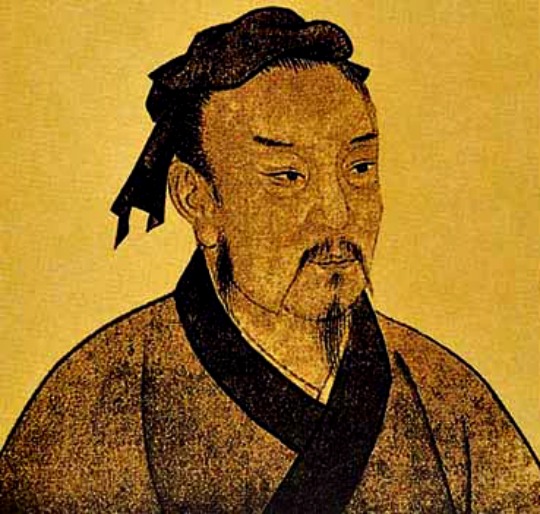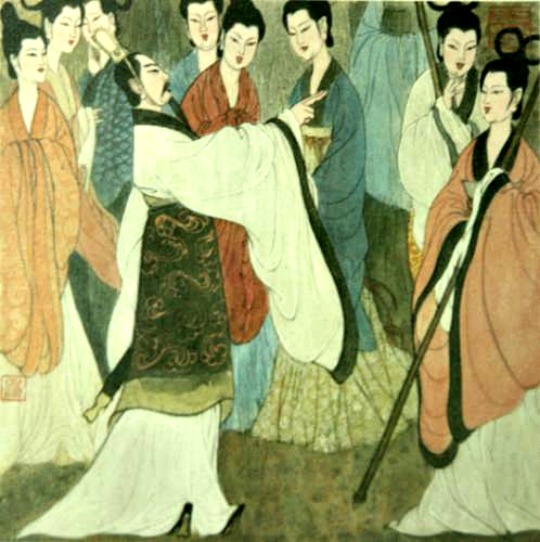Date Published: 2015-11-05
Sun Tzu's Art of War is Still Relevant
By Adelia Ladson
 Sun Tzu was a military strategist and a noteworthy philosopher.
Sun Tzu was a military strategist and a noteworthy philosopher.  Sun Tzu was a military strategist and a noteworthy philosopher.
Sun Tzu was a military strategist and a noteworthy philosopher.
 Sun Tzu trains the king's harem.
Sun Tzu trains the king's harem.  Sun Tzu trains the king's harem.
Sun Tzu trains the king's harem.
 The Art of War is read worldwide and its principles applied in many aspects of life.
The Art of War is read worldwide and its principles applied in many aspects of life.  he Art of War is read worldwide and its principles applied in many aspects of life.
he Art of War is read worldwide and its principles applied in many aspects of life.
Shop All Chinese Swords Here
Few books have stood the test of centuries and have remained as relevant as “The Art of War” by Sun Tzu. Written by the Chinese general as a treatise on military strategy, it’s still studied and put in to practice but not just within the realm of military strategy. Sun Tzu’s strategies have also been used in the realms of business and industry, which makes perfect sense as the global Economic War is just as real. Of course, being an astute philosopher, he was most assuredly aware that his tenets were adaptable to an individual’s personal life and goals, as well.
 Sun Tzu was a military strategist and a noteworthy philosopher.
Sun Tzu was a military strategist and a noteworthy philosopher. Sun Tzu was a military strategist and a noteworthy philosopher.
Sun Tzu was a military strategist and a noteworthy philosopher. I think my favorite quote for “The Art of War” is: “If your opponent is of choleric temper, seek to irritate him.” This is a strategy that I employed naturally as a sibling. Although, it wasn’t so much as strategy to achieve a goal as it was because I was bored. I see this strategy employed in politics quite a bit. Nothing like raising a little ire to throw a candidate off his game.
Sun Tzu’s life is a little vague in its details, which is understandable because he lived from sometime around 544 B.C. to 496 B.C. Some are even skeptical about whether he was the author of “The Art of War” or whether it was written in the period following his death. Scholars do seem to agree, based on the oldest texts, that he was a general who served under a Chinese king in the late sixth century B.C. And the story or legend of his “job interview” with the king is entertaining. Apparently, he was tasked by the king to train his royal harem into soldiers.
Sun Tzu’s life is a little vague in its details, which is understandable because he lived from sometime around 544 B.C. to 496 B.C. Some are even skeptical about whether he was the author of “The Art of War” or whether it was written in the period following his death. Scholars do seem to agree, based on the oldest texts, that he was a general who served under a Chinese king in the late sixth century B.C. And the story or legend of his “job interview” with the king is entertaining. Apparently, he was tasked by the king to train his royal harem into soldiers.
 Sun Tzu trains the king's harem.
Sun Tzu trains the king's harem. Sun Tzu trains the king's harem.
Sun Tzu trains the king's harem. Even though this was basically a passel of giggling, silly women, Sun Tzu forged ahead. He divided them into two companies and appointed the king’s two favorite women as the officers. He then gave the order that the companies face right and the women only disintegrated into laughter. The general, taking the blame upon himself, let the king know that if the soldiers did not understand the commands given to them, it was the general’s fault. He went to great lengths to explain to the two companies and its two “officers” what was expected of them. Once again, he ordered them to face right, which ended with the same results. At this point, he told the king if, once explained to the soldiers, they still did not comply, then it was the officers fault. He summarily executed the two “officers,” who were the favorite concubines of the king (to the king’s dismay), appointed two more “officers.” Low, and behold, the next time he gave the order to face right, everyone was onboard with the idea and he didn’t have any more problems. He told the king that, once appointed, a general should carry out his duties even in spite of a king’s feelings. It was this no-nonsense, straightforward approach to warfare and life that still resonates in today’s world and continues to be adapted for all manner of situations. It must have worked because he was “hired” by the king and enjoyed a very successful military career putting his strategies into practice.
 The Art of War is read worldwide and its principles applied in many aspects of life.
The Art of War is read worldwide and its principles applied in many aspects of life. he Art of War is read worldwide and its principles applied in many aspects of life.
he Art of War is read worldwide and its principles applied in many aspects of life. One of Sun Tzu’s most quoted principles is: “One who knows the enemy and knows himself will not be in danger in a hundred battles.” It has been used in everything from books on construction crew supervision to reports put together by the U.K.’s House of Commons, which was used as a support statement for using intelligence and information to combat terrorism. I have even seen it used in a book that told you how to write a novel. Go figure. In business, his “opportunities multiply as they are seized” and “do not repeat the tactics which have gained you one victory but let your methods be regulated by the infinite variety of circumstances” are prime examples of sound business advice that has been gleaned and used from “The Art of War” over the years.
As, I said before, there has been a difference in opinion on whether the legendary general even wrote the text or if it was attributed to him because he was a legend. In the end, I guess it really doesn’t matter if Sun Tzu was not the definitive author of “The Art of War” because there will probably never be definitive proof one way or the other. The important thing is that the text exists and has survived for centuries to benefit the global community with its sound principles. Folks, that’s no small potatoes there! So, I highly recommend giving it a read because you just might be surprised what you find in it that is relevant to you.
Related Products
